 W
WThe 1958 United States elections were held on November 4, 1958, and elected members of the 86th United States Congress. The election took place in the middle of Republican President Dwight D. Eisenhower's second term. Eisenhower's party suffered large losses. They lost 48 seats to the Democratic Party in the House of Representatives, and also lost thirteen seats in the U.S. Senate to the Democrats. This marked the first time that the six-year itch phenomenon occurred during a Republican presidency since Ulysses S. Grant's second term in 1874. Alaska and Hawaii were admitted as states during the 86th Congress.
 W
WThe Agricultural Stabilization and Conservation Service (ASCS) was an agency of the United States Department of Agriculture. It administered programs concerning farm products and agricultural conservation. It granted loans to farmers; purchased farm products from farmers and processors; administered land allotment and marketing quota programs; shared the cost of resource conservation and environmental protection measures with farmers and ranchers; and supervised civil defense activities relating to food. It also managed the inventories of the Commodity Credit Corporation. The ASCS was established in 1961.
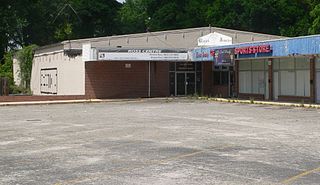 W
WAll-Star Triangle Bowl is a bowling alley located in Orangeburg, South Carolina, United States. The lanes are a historic fixture of the community. The original owner was Harry K. Floyd. All-Star Triangle Bowl is most known for its fundamental role in the Orangeburg Massacre, which was sparked as a result of Floyd refusing to allow people of color to bowl at the privately owned bowling alley. He owned and operated the alley until his death on July 12, 2002, following which his son, Harry K. Floyd, Jr., took over.
 W
WThe Barber of Birmingham is a 2011 documentary film about James Armstrong, one of the unsung heroes of the Civil Rights Movement. A World War II veteran and an original flag bearer for the 1965 Selma to Montgomery marches, Armstrong has run a voter education program out of his barbershop in Birmingham, Alabama for 50 years. The film was co-directed and produced by Gail Dolgin and Robin Fryday. It premiered at the 2011 Sundance Film Festival, three months after Dolgin's death in October 2010 from breast cancer. It was named best short documentary at the Ashland Independent Film Festival. The film was nominated for the Academy Award for Best Documentary at the 84th Academy Awards. It later aired on television on the PBS series POV.
 W
WBlood Done Sign My Name is a 2010 American drama film written and directed by Jeb Stuart and starring Ricky Schroder, Omar Benson Miller, Michael Rooker, and Nate Parker. It is based on the autobiographical book Blood Done Sign My Name (2004) by historian Timothy Tyson.
 W
WBombingham is a nickname for Birmingham, Alabama during the Civil Rights Movement due to the 50 dynamite explosions that occurred in the city between 1947 and 1965. The bombings were initially used against African Americans attempting to move into neighborhoods with entirely white residents. Later, the bombings were used against anyone working towards racial desegregation in the city. One neighborhood within Birmingham experienced so many bombings it developed the nickname of Dynamite Hill.
 W
WBoycott is a 2001 American made-for-television biographical drama film directed by Clark Johnson, and starring Jeffrey Wright as Martin Luther King Jr. The film, based on the book Daybreak of Freedom by Stewart Burns, tells the story of the 1955-1956 Montgomery bus boycott. It won a Peabody Award in 2001 "for refusing to allow history to slip into 'the past.'"
 W
WOn the evening of July 13, 1965, Hubert Damon Strange shot Willie Brewster as Brewster drove past him on Highway 202 outside Anniston, Alabama; two days later, Brewster died in hospital. In December of that year, Strange was convicted of second-degree murder; this was the first time in the history of Alabama that a white man was convicted of killing a black man.
 W
WThe Children is a 1998 book by David Halberstam which chronicles the 1959–1962 Nashville Student Movement.
 W
WCicero March is a 1966 short documentary film made by the Chicago-based production company, The Film Group. The film details a civil rights march held on September 4, 1966 in Cicero, Illinois.
 W
WThe Ernest Green Story is a 1993 American made-for-television biographical film which follows the true story of Ernest Green and eight other African-American high-school students as they embark on their historic journey to integrate Little Rock Central High School in Little Rock, Arkansas, in 1957. The film was developed and executive produced by Carol Ann Abrams. Much of the movie was filmed on location at Central High School.
 W
WThe Woolworth, F.W., Building was a historic department store building located in Lexington, Kentucky, that served as a retail location for the F. W. Woolworth Company from 1946 to 1990. It was designed by Frederick W. Garber.
 W
WFor Us the Living: The Medgar Evers Story is a 1983 American made-for-television biographical film based on the 1967 book, For Us, the Living, by Myrlie Evers-Williams and William Peters. It was broadcast on the PBS television program American Playhouse on March 22, 1983.
 W
WFreedom, Inc. or Freedom, Incorporated of Kansas City Missouri is a political organization founded in 1961 by five African-American political activists, Bruce Watkins, Howard Maupin, Charles Moore, Fred Curls, Leon Jordan. This was crucial to desegregation of Kansas City Missouri public facilities, the election of many black Missouri State Representatives since 1963, the "strong" candidacy of Bruce R. Watkins for Mayor of Kansas City in 1978-79, the 1982 election of Alan Wheat, the first black Congressman to represent a majority-white district in the Greater Kansas City Missouri Metropolitan Area, the 1991 election of Emmanuel Cleaver as the first black mayor of Kansas City, and—according to new information reported on KKFI on February 18, 2012 during an on-air interview of filmmaker Emiel Cleaver, possibly a blueprint responsible for elections of "First Black Mayors" in New Orleans, Louisiana and other major U.S. cities. The organization was reportedly the brainchild of Leon M. Jordan and Bruce R. Watkins, who were elected its first chairman and co-chairman, respectively.
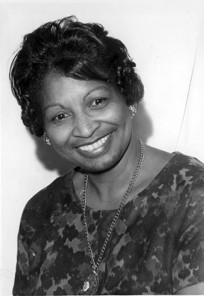 W
WThelma Glass was an American civil rights activist, noted for helping to organize the Montgomery bus boycott of 1955, and a professor of geography.
 W
W"Heed Their Rising Voices" is a 1960 newspaper advertisement published in the New York Times. It was published on March 29, 1960 and paid for by the "Committee to Defend Martin Luther King and the Struggle for Freedom in the South". The purpose of the advertisement was to attract attention and steer support towards Martin Luther King Jr. A recent felony charge of perjury was leveled against King and could have resulted in a lengthy imprisonment. The headline of the advertisement was drawn from a phrase used in the New York Times editorial, "Amendment XV", published on March 19, 1960. The advertisement became the source of a libel suit in the United States Supreme Court case New York Times Co. v. Sullivan (1964).
 W
WThe International Longshoreman's Association Hall is a historic labor union meeting hall in Mobile, Alabama. The International Longshoremen's Association established the Mobile chapter in 1936 in order to represent the city's African American longshoremen. The hall was built in 1949 in the Art Moderne style. Many prominent African-American entertainers performed in its auditorium. It became a gathering place during the Civil Rights Movement. On January 1, 1959, it became the only place in Mobile to host a speaking engagement by Martin Luther King Jr. It was added to the National Register of Historic Places on June 27, 2011.
 W
WKing is a 1978 American television miniseries based on the life of Martin Luther King Jr., the American civil rights leader. It aired for three consecutive nights on NBC from February 12 through 14, 1978.
 W
WKing in the Wilderness is an American documentary film about Martin Luther King Jr. that premiered on April 2, 2018 on HBO, focusing on the final two years of his life leading up to his assassination on April 4, 1968. The film includes some never-before-seen footage of interviews with some of those closest to King interspersed with historical archives during a period of his life. In addition to upsetting both President Lyndon Johnson and the FBI Director J. Edgar Hoover, as well as numerous other opposition groups, and despite King's own self-doubts as he was coming to terms with his possible death, he refused to back away from the civil rights and anti-war challenges of his times.
 W
WMartin Luther King Jr. Shoreline is a regional park located on the shores of the San Leandro Bay in Oakland, California. Part of the East Bay Regional Parks system, it is named after Civil Rights Movement leader Martin Luther King Jr. The park was established in 1993 on a 741 acres (300 ha) tract of land leased from the Oakland Airport.
 W
WDoug McAdam is Professor of Sociology at Stanford University. He is the author or co-author of over a dozen books and over fifty articles, and is widely credited as one of the pioneers of the political process model in social movement analysis. He wrote one of the first books on the theory in 1982 when analyzing the U.S. Civil Rights Movement: Political Process and the Development of the Black Insurgency 1930-1970. His other book Freedom Summer won the C. Wright Mills Award in 1990. He served as the director of the prestigious Center for Advanced Study in the Behavioral Sciences between 2001 and 2005. He was elected to the American Academy of Arts and Sciences in 2003.
 W
WThe Meeting is a 1987 American play by Jeff Stetson about an imaginary meeting between Martin Luther King Jr. and Malcolm X in 1965 in a hotel in Harlem during the height of the Civil Rights Movement. The play was later televised on American Playhouse in 1989.
 W
WMighty Times: The Children's March is a 2004 American short documentary film about the Birmingham, Alabama civil rights marches in the 1960s, highlighting the bravery of young activists involved in the Children's Crusade. It was directed by Robert Houston and produced by Robert Hudson. In 2005, the film won an Oscar at the 77th Academy Awards for Documentary Short Subject. The film was co-produced by the Southern Poverty Law Center and HBO.
 W
WHenry Moskowitz was a civil rights activist, and one of the co-founders of the National Association for the Advancement of Colored People.
 W
WMurder in Mississippi is a 1990 television film which dramatized the last weeks of civil rights activists Michael "Mickey" Schwerner, Andrew Goodman and James Chaney, and the events leading up to their disappearance and subsequent murder during Freedom Summer in 1964. It starred Tom Hulce as Schwerner, Jennifer Grey as his wife Rita, Blair Underwood as Chaney, and Josh Charles as Goodman. Hulce received a nomination for Best Actor in a TV Miniseries at the 1990 Golden Globes.
 W
WThe National Voting Rights Museum and Institute, established in 1991 and opened in 1993, is an American museum in Selma, Alabama, which honors, chronicles, collects, archives, and displays the artifacts and testimony of the activists who participated in the events leading up to and including the 1965 Selma to Montgomery marches, and passage of the 1965 Voting Rights Act, as well as those who worked for the African-American Voting Rights and Women's Suffrage movements. As the museum describes in its mission statement, it recognizes other people, events, and actions which furthered America's Right to Vote since "the Founding Fathers first planted the seeds of democracy in 1776." The museum was founded by Faya Ora Rose Touré and Marie Foster.
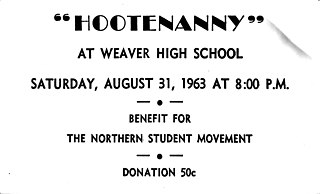 W
W(Image link broken ) coment: Latest NSM veterans Bill Strickland, Frank Joyce and Joan Cannaday Countryman in a 2010 panel discussion in Raleigh, N.C., sponsored by the Association for the Study of African American Life and History.
 W
WEverett Carlton Parker was an American media activist and ordained minister of the United Church of Christ.
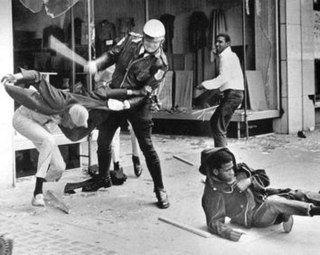 W
WLarry Payne was a sixteen-year old African American teenager who was killed following a march in support of the Memphis sanitation strike on Thursday, March 28, 1968, in Memphis, Tennessee. He was the only fatality on that day although the New Pittsburgh Courier reported 60 injured and 276 arrested.
 W
W"The Stones I Throw " was the A-side to the 1965 single by Levon and the Hawks, released on Atco Records. Seemingly a comment by Robbie Robertson in favor of the Civil Rights Movement, it is carried by Garth Hudson's organ, and is far less rooted in the heavy R&B stylings of the group's other three single sides. It is the link between their days with Ronnie Hawkins and the group's breakout 1968 LP, Music from Big Pink. In December, 1965 the song reached #22 on the CHUM Chart.
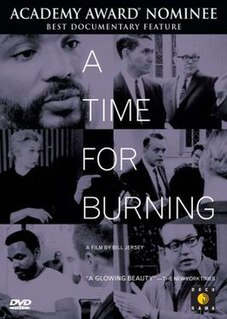 W
WA Time for Burning is a 1966 American documentary film that explores the attempts of the minister of Augustana Lutheran Church in Omaha, Nebraska, to persuade his all-white congregation to reach out to "Negro" Lutherans in the city's north side. The film was directed by San Francisco filmmaker William C. Jersey and was nominated for Best Documentary Feature in the 1967 Academy Awards. The film was commissioned by the Lutheran Church in America.